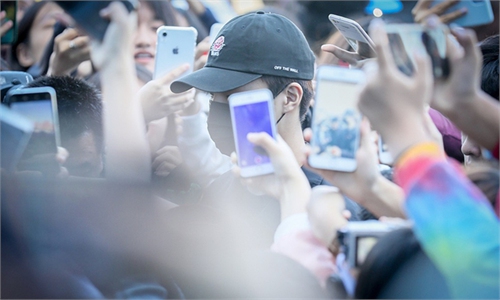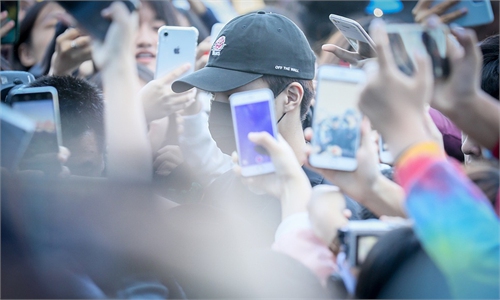Profit-seeking capital drives 'fan circle' chaos
Campaign aims to regulate irrational idol market

fans Photo:VCG
Fanquan (fans circle) culture is in the spotlight in China amid the country's fierce rectification campaign in the field. But fans' irrational actions are just externalities of the fanquan chaos, and the essential reason driving the circle into chaos is the profit-seeking operation of capital in the entertainment industry amid a lack of management.
The idol market in China will reportedly be valued at about 140 billion yuan ($21.6 billion) in 2022. Facing such a booming market, the current rectification campaign is just in time to create a clear environment for fans to rationally chase stars, officials and experts noted.
A Chinese fan told the Global Times on Monday on condition of anonymity that stars usually have contracts with brokers, who can introduce them to opportunities to endorse brands or participate in dramas and films. "These 'opportunities' are mostly controlled by brokers," said the fan.
She said that the payments for endorsements or starring roles were basically determined by how much internet traffic such stars can direct, which can be reflected by their ranks on various "popularity lists."
The Cyberspace Administration of China published a notice on Friday on its website asking provincial offices to heighten efforts to rectify the fan circle chaos. The administration specified 10 measures, including cancelling all ranking of entertainers, barring forums that pick fights and lead to chaos and requesting agencies to better guide fan groups.
Li Ming (pseudonym), who works for a marketing company as a project leader, told the Global Times on Monday that, in the entertainment industry, fans mean data. But data can be faked, which has become a public secret in the process of promotion in the industry. "Just pay some amount of money, some server in a remote region will help you add playback volumes."
Under this model, most brokers realize they can hire robots to boost the popularity of a specific performer, who can then earn more money from endorsements and starring roles, the fan said.
In July 2019, an epic clash on Sina Weibo's "influential power" ranking list between fans of 40-year-old singer Jay Chou and young celebrity Cai Xukun brought the phenomenon of fans forging digital data to show popularity into the spotlight. The list was published weekly and showed the trending influence of Chinese stars.
Behind the battle is the hot topic "swiping digital dates," which means fans may buy website views or topic hits to show their devotion and support for their idols. Stars may also forge numbers through automated or artificial platforms to increase their influence.
According to observers reached by the Global Times, various "swiping digital data" platforms in China are estimated at more than 1,000 in total, and the top 100 can earn around 2 million yuan monthly.
Under the "traffic talks" tendency, the producers would pay more money to hire a spokesperson than developing better products. Fans will buy the products anyway, no matter what the quality is.
"If all producers do so, our economy would grow into a bubble," Shen Yi, a professor at the School of International Relations and Public Affairs of Fudan University, told the Global Times on Monday.
Zhu Yannan, an official from the National Radio and Television Administration, recently said at a forum that the targets of the rectification campaign are brokers, entertainment agencies and platforms, as well as capital, while the young fans are the group that needed to be guided and educated.
The brokers and stars' studios would hire professional fans to take charge of fans' clubs after a star becomes famous. These fans would hype topics concerning the star to attract traffic and even use psychological strategy to run the fandom in an organized way, leading young fans to give up their self-consciousness and turning them into "data workers," according to industry employees.
"Most brokers have vowed to fans that they would support their idols rationally after the regulation was issued, but they are the ones who should take responsibility," the fan said.
The Global Times learned that some fans had chased Chinese actor Gong Jun for about four years, but chose to close the fan club months ago as she couldn't stand the accusations and verbal attacks by professional fans for failing to seriously promote Gong on the internet after Gong surged into popularity in February for the yearly hit drama Word of Honor.
Brokers usually can get most of the actors' and actresses' payments. "For some actors and actresses who are not so famous, brokers may extract at most 80 percent and even 90 percent. That's why lots of famous actors and actresses want to found their own brokers," according to the fan.
In the industry chain, the idol is only a symbol. Sometimes they are also innocent. "Who is the winner of this dirty game? Just see where the money goes," Li said.
There are also financial risks behind the fanquan chaos as many crazy fans even borrow money to buy "swipe digital data" for their idols.
Some entertainment platforms would encourage fans to borrow money from certain loan platforms by promising them more traffic or data for their idols.
According to media reports, the annual interest rate on a loan on Sina Weibo launched in 2019 for the Double 11 shopping festival was as high as 54 percent. Weibo promised that fans could double the number of likes of one certain post after they borrowed a certain number of money from the project, which was closed due to flooding complaints.
The current campaign is indeed affecting the industry. Li said that, as far as she knew, some planned projects have been delayed, and the budget for promotion has been halved. Despite some worry over her career, Li still expressed personal support for cleaning the industry and said she hoped those who create good content could be encouraged and promoted.



